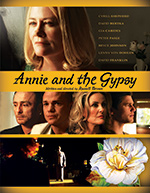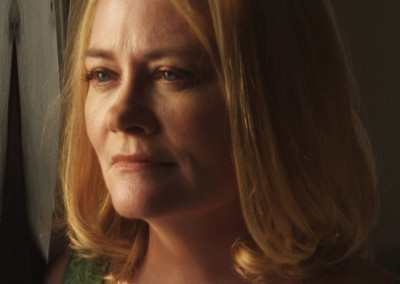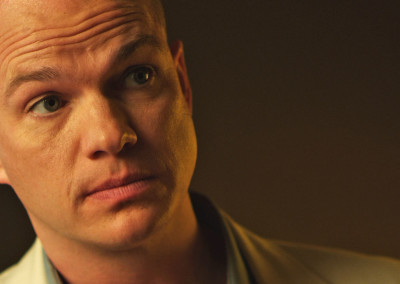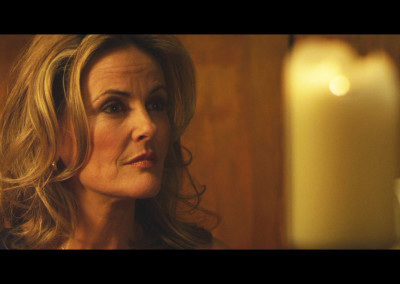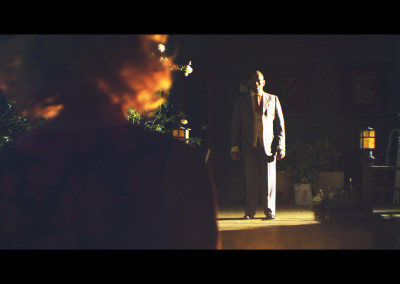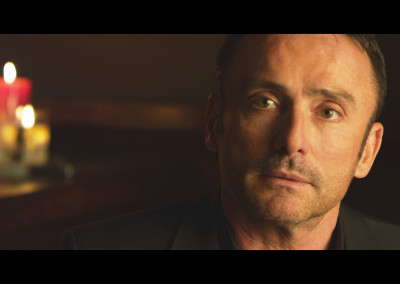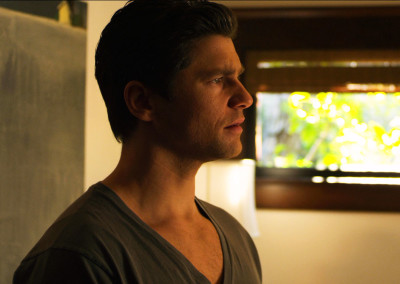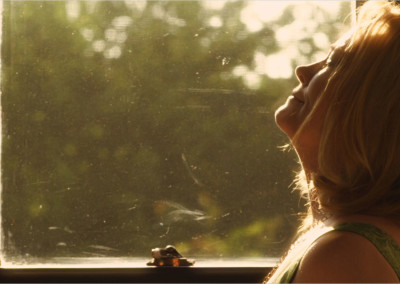Annie and the Gypsy
“Writer/director Russell Brown makes short, sharp films that investigate how and why friends treat each other badly… In Annie and the Gypsy, Brown’s most ambitious, and arguably most accomplished film to date, Brown provides a keenly observed study of the title character (deftly played by Cybill Shepherd) who throws a Spanish-themed dinner party hoping to reconnect with Gordon, a man she loved in Spain decades ago.” – Film International
“Ms Shepherd here, as elsewhere in the film, does a lovely job with a role that offers little of her usual snark and tamped-down anger. Together with the writer/director, she makes Annie — and her movie — special and moving.” – Trust Movies
Synopsis
Annie and the Gypsy is a melodrama that revolves around an artist (Cybill Shepherd) who throws a Spanish-themed dinner party in the hopes of rekindling the great love affair of her youth. A passionate woman who fills her home with poetry and paintings, Annie is a genuine romantic which also leaves her vulnerable to disappointment and occasional delusion. As the evening progresses, her expectations of love transform as she faces painful truths about her past and present. Fueled by the strong words of her favorite poet — Federico García Lorca — Annie will redefine her vision for the future and her definition of happiness over the course of this dark night of reckoning.
Credits
Written and directed by
Russell Brown
Produced by
Russell Brown
Kerry Barden
Karuna Eberl
Edited by
Lucyna Wojciechowki
Christopher Munch
Cinematography by
Alexandre Naufel
Starring
Cybill Shepherd
David Burtka
Also Starring
Gia Carides
Peter Paige
David Franklin
Lenny von Dohlen
Bryce Johnson
Eliezer Ortiz
Distribution
Osiris Entertainment
Press
“Cut away my shadow. Free me from the torment of seeing myself without fruit.” – Federico García Lorca. Annie (Cybill Shepherd) has planned the perfect dinner party, with bushels of white camellias, traditional paella, rhubarb galette, and just the right guests. She’s invited all of her most interesting friends from creative industries to mix cocktails and picked out the perfect musical accompaniment, hoping to impress her guest of honor: a lost former lover from her romantic past in Spain. Everything seems perfect as she starts to set the table and prepare the food, but then a series of small accidents and a cancellation threaten to escalate into a complete meltdown. The disasters set the tone for an evening that threatens to rend relationships and force her guests to confront their own unhappiness. Punctuated by the poetry of Federico García Lorca, this film is a meditation on the connection between passion and creativity.” – Seattle International Film Festival Guide
![]()
“Writer/director Russell Brown makes short, sharp films that investigate how and why friends treat each other badly… In Annie and the Gypsy, Brown’s most ambitious, and arguably most accomplished film to date, Brown provides a keenly-observed study of the title character (deftly played by Cybill Shepherd) who throws a Spanish-themed dinner party hoping to reconnect with Gordon, a man she loved in Spain decades ago.” – Film International
![]()
Writer/director Russell Brown makes short, sharp films that investigate how and why friends treat each other badly. His enjoyable feature debut Race You to the Bottom(2005) had two BFFs taking a tour through wine country and cutting each other down over the course of their travels. His sophomore effort, The Blue Tooth Virgin (2008), was an incisive film that depicted a screenwriter asking his pal for feedback on his new script-only to regret that request.
In Annie and the Gypsy, Brown’s most ambitious, and arguably most accomplished film to date (now out on DVD), Brown provides a keenly-observed study of the title character (deftly played by Cybill Shepherd) who throws a Spanish-themed dinner party hoping to reconnect with Gordon (Lenny Von Dohlen), a man she loved in Spain decades ago. While Gordon is supposed to arrive late to the party, most of the guests cancel. The only couple that attends is Dana (Gia Carides) a bitchy Hollywood executive, and her kept husband Jonathan (David Franklin).
As such, Annie invites her catering assistant Martin (David Burtka) and his boyfriend Roger (Peter Paige) to fill out the table. The meal becomes increasable more awkward (and more entertaining) as the characters debate art, work, money and love and friendship with strongly conflicting sensibilities. After both the dinner party and some relationships deteriorate, Annie, who clings to her memories of Spain and the writing of Federico Garcia Lorca, has an epiphany.
In a recent Skype interview, Brown talked about his intriguing film and his passion for Lorca’s writing.
Gary M. Kramer: Annie and the Gypsy is all about loneliness, regrets, and compromise, cowardice and courage and the poetry of Garcia Lorca. What prompted you to intertwine these themes for this film?
Russell Brown: I think in terms of courage, that idea came out of wanting to tell a story where at the end of the movie, it is not about relying on other people-guests, friends, ex-lovers-for your happiness, but getting to that place in your soul where you’re self-centered. That’s a scary thing for people. But I think that’s a theme that a lot of people will find useful. I think the healthiest relationships are the ones where you’re not trying to fill an empty void with other people.
GMK: You artfully address the dynamics of friendships, and the power shifts and struggles between partners in relationships across both gender and sexual divides. How did you construct the characters in Annie and the Gypsy,which divide across gay and straight; male and female; old and young; rich and poor?
RB: Martin and Annie are people who see things in various shades of gray and they struggle with not knowing what things are. They are more sensitive. Dana and Roger know what they want, and are more self-assured. They end up together and negotiate that world-view difference. Within those two relationships, they were set up as parallels, negotiation about money, sex, and these two people in each relationship. I was interested in playing out that negotiation.
GMK: What about the way the characters talk about art, food, music, and poetry?
RB: How they talk about paintings is really revealing in terms of who they are, what they value, and how they interact with other people. The way people take in art says a lot about who they are and how they treat people.
GMK: Annie was devoted to Spain in everything she did-her art, music, cooking, painting, poetry. It represented the time in her life when she was happiest, wildest. Why did you give her this backstory and fondness for Lorca?
RB: I think you develop associations with places-if you were there, you’d be happier. In Chekov, if they can get to Moscow… Spain has taken on a real mythical resonance in Annie’s life. Lorca came from me. I love Lorca, his poems, and his plays. The genesis of this was that I wanted to try to write a play like Lorca. It was like a game: How do I tell a Lorca story through my own voice? Lorca’s theatre and poetry are so much about these women in a state of crisis, so how do you make that feel contemporary. Lorca’s poetry, presence and sprit came into the screenplay. Lorca and I became friends-as crazy as that sounds. It would be great if people who saw the film thought the poems were really beautiful and sought out his work.
GMK: How did you construct the film’s visual style? The dinner party scenes have a theatrical quality, interrupted from time to time with “flashback” moments of Annie’s memories of Spain.
RB: I looked a lot at two of my favorite films-Autumn Sonata and Abigail’s Party-as inspiration. You’re in a confined space but the shots have to tell an inner story. It’s hard to tell a story in real time in a confined space. The interstitial scenes [reflect] what Annie thinks she saw. Her memory and her romance turned what really happened into that type of hallucinogenic, romantic, saturated imagery.
GMK: The narrative structure is also deliberate and unusual. The first hour is mostly Annie’s absorbing dinner party; but it’s the aftermath that is the more interesting section-how she reacts to the events that unfold. Can you discuss why you eschewed the formalism in the last reel?
RB: The movie goes into her mind in that section after the dinner party. I feel that’s something Lorca does: duende. You’re conjuring this spirituality and depth and passion in the audience. That sequence in her mind and you go to this psychologically profound place with her.
GMK: Let’s talk about the casting. You get a strong, sympathetic performance from Cybill Shepherd, and she is well supported by David Burtka in his first starring role. How did you work with these actors and develop their relationship?
RB: It was different for everybody. Cybill-the first time I met her was an audition for both of us. She was feeling me out. I said I’d seen this character as Daisy Miller grown up and that clicked for her. From there, I think a lot of what she brought to this film is her own experience and wisdom-larger than life. We would talk about Spain, and she said Orson Welles took her through Spain when she was a young girl. She brought her soul and power into the part. I just encouraged her. A big theme of the film is that she’s saved by poetry. It takes hold of her and changes her. When the gypsy reads that poem to her, it changes her life. So when she reads the poems, she was relying on that…David had a successful career in the theatre. That is a lot of what working with him is like: He’s very text oriented. He’s a theatre animal and has a facility with words. He’s such a sweet person, and that helped him a lot in that part, plus he was a caterer.
GMK: OK, last question: What was the worst dinner party you’ve thrown or been to?
RB: [LAUGHS]. Oh my god! I had this dinner party once. There were eight people there. I’d invited this guy I had just started dating, and my friends were meeting him for the first time. This is not an inspiration for the movie. Halfway through the party he got up, said he’s going to the rest room and disappeared. He never came back. The rest of the dinner was awkward because everyone was thinking I was dealing with his big rejection. Then at 2 in the morning he texted me to say, “I am so sorry, I was feeling sick.” – By Gary M. Kramer, Film International
Gary M. Kramer is the author of Independent Queer Cinema: Reviews and Interviews, and co-editor of the forthcoming Directory of World Cinema: Argentina.
![]()
One of those dinner parties from hell — if indeed it ever actually takes place — is the event around which Russell Brown’s new film centers. In that center, as the hostess of said party, is an actress of some renown (multi-Golden Globe awards and numerous Emmy nominations, among other honors), Cybill Shepherd. This actress’ fan base from two major Emmy-winning television shows alone should haul in a lot of viewers. TrustMovies would have imagined that this might have guaranteed the film at least a small theatrical release, but the rules of the game are so strange, if not outright screwy, these days, that any guarantee of anything seems permanently off.
Mr. Brown (the very youthful-looking filmmaker shown at left) has himself given us a couple of interesting movies over the past decade — Race You to the Bottom and an even-better The Blue Tooth Virgin — that deal with slightly oddball people trying to work out their place in the world. This is also the case with Brown’s latest work, even if its protagonist is a good deal older than those of his earlier films. What makes ANNIE AND THE GYPSY (which was earlier known as White Camellias, as it toured the festival circuit over the past year or so) particularly strange is how it morphs from a will-it-happen-or-won’t-it? kind of movie into a compelling character study of a woman (the titular Annie, played by Ms Shepherd, shown below and further below) who is stuck in her past and is trying to break through to some kind of healthy present.
To that end, she has planned a major dinner party that will introduce her guests to a man she has recently reconnected with and who might just be the love of her life. Annie has a lot riding on this dinner party — way too much, really — as her friend and culinary helper….
a gay young man (played with sweetness and charm by David Burtka, above) who’s having trouble with his own companion but is on hand to help Annie prepare for her big evening, tries to tell her. Complications ensue.
If, for awhile, it looks like the movie will degenerate into the obvious, hold on. Once some guests arrive, in the persons of Peter Paige, below, as that not-so-nice companion (Mr. Paige is excellent, as always)…
and a rather dim fellow played by David Franklin, below, who starts out a little crazy if not creepy, but slowly wins us over…
and an absolutely riveting Gia Carides, below, as his alpha mate — remember her delicious turn as the Gennifer Flowers figure inPrimary Colors? — the energy level rises noticeably and we get some crackerjack scenes that keep us suspended.
The above actors are so good that, for awhile, they seem to steal the movie. Not to worry, the filmmaker knows what he is doing and soon brings us back into the Shepherd fold. Along the way, we’ve learned of Annie’s past in Spain, of her art aspirations and of the man she loved.
All these come back during and after the dinner party, as does that titular gypsy (Eliezer Ortiz, above) who stands for…. well, you interpret this one. Toward the end we see, if not meet, the dream man (played by Lenny von Dohlen) and also witness a few mo-ments in which Annie talks with someone special. This scene, to my knowledge, is a film “first,” in which Brown provides us something strange and intimate to ponder. Ms Shepherd here, as elsewhere in the film, does a lovely job with a role that offers little of her usual snark and tamped-down anger. Together with the writer/director, she makes Annie — and her movie — special and moving. – Trust Movies
Annie and the Gypsy, from Osiris Entertainment, hits the street this Tuesday, March 12, on DVD and will probably be available via VOD, streaming or cable TV, eventually.
Festivals

Director's Notes
I was cooking dinner for a small gathering a few years ago and I wondered what it would feel like if everyone cancelled. What emerged was a sense that my own happiness often depended on the validation or approval of others, of their participation in my life in the way that I wanted or had “designed” for them. I started to consider how this need from other people left me in an always vulnerable state, a position that compromised my own strength and power as an individual. I thought about other people in my life who put themselves in this similar position, and at this moment I imagined Annie, the central figure in White Camellias who over the course of one night learns that she alone is responsible for her self-actualization. And so, this project began as an examination of how having expectations — of romance, of friends, of art — can lead to spiritual disappointment, and how those expectations must be overcome in order to be free. Like my previous movies, The Blue Tooth Virgin and Race You to the Bottom, I wanted to explore these ideas in a chamber-film, which is a structure I find exciting and interesting, and it seemed like the evolution of a failing dinner party was a set-up suited to this form.
As I began to write, it quickly occurred to me that Annie’s situation mimicked the type of melodrama present in the plays and poems of my favorite dramatist, Federico García Lorca. I quickly decided that it might be an intriguing experiment to see if I could merge my own writing style with Lorca’s, and to explore a Lorca-esque theme through a contemporary lens. One of the great joys of writing the screenplay was rethinking and rediscovering Lorca, having him by my side as I developed this story. It seemed to me that Lorca himself must be a part of the proceedings, and his presence as a creative guide soon turned into both an element that would drive the plot and also lend a certain fervor to the language of the movie.
It was fitting to use his poems throughout, as Annie herself became more and more a woman out of time and place. As the script developed, one of the major themes was the difference between “Camellias” and “non-Camellias” (as I thought of it) and how these two forces often end up in romantic entanglements with each other. Camellias, for me, value art, poems, sensuality and ideal love (and are represented in the film by Annie, Martin and Jonathan) whereas non-Camellias (represented in the film my Roger and Dana) are practical, accepting of compromise and tougher than their counterparts. Exploring the conflicting and complicated needs and expectations of relationships through this categorization brought forth complex dynamics, and I began to layer these characters with the struggles and idiosyncrasies of contemporary life. More than anything, I learned that Camellias have a difficult time in the modern world, and so they look to ancient places and culture of the past to give them solace.
What was most important, however, was to bring Annie to life as a woman who was truly ruled by her loves — for painting, for poetry, for Spain, for youth and for great romance. Her vibrancy and life-force made her seem strange to those around her, frustrating to understand, and a bit out of touch. But at the same time, it was her absolute belief in the things that were important to her that made her such an appealing character to write. Although occasionally delusional and demanding, Annie became the type of person I wish there were more of in the world, camellias who feels that it is viable to live everyday through the prism of art and poetry.
Cybill Shepherd’s involvement in the film was a type of fate, a work of magic that Annie herself might have conjured. From our first meeting, it was obvious to me that Cybill’s own life force could breathe life into this passionate character. (It occurred to me early on that Annie might be thought of as a grown up counterpart to the hot-blooded Daisy Miller.) As I got to know Cybill more closely, it was startling to me how Annie’s best qualities — her artistry, her high ideals, her fiery spirit — were shared by the actress playing her. In rehearsals, Cybill’s instincts about dialogue and motivation, moments she felt could be better, words that weren’t needed, passages that were, became a guiding force that I always trusted. As she told me about her early experiences making films and traveling the world, I saw in her the type of gypsy that Annie once was, and the collaboration between us became fast and lighthearted.
Annie’s balance in the movie, Martin, similarly became a balancing force in real life when David Burtka joined the cast. Throughout the film, Martin provides caring and an almost maternal understanding to the woman he is trying to help through this difficult time. With Martin, David was able to be nurturing without being obsequious, gentle without being condescending, and tender without being treacly. In an act of art reflecting life, David also has a career as a caterer, so he understood the complex dynamic that can develop between emotionally needy clients and eager-to-help staff.
The supporting players in the movie provided unique angles to their roles that weren’t anticipated in the script. The indefatigable Gia Carides brought forth the sympathetic side of the viperous Dana; an independent filmmaker himself, Peter Paige made Roger just as funny as he was mean, and was an invaluable comrade during the shoot; David Franklin perfectly captured the sexiness that comes from being kind in his portrayal of Jonathan; Lenny Von Dohlen is firm and tragic as the ambiguous Gordon; Eliezer Ortiz is spooky yet wise as the gypsy; my friend Bryce Johnson (who starred in my second feature narrative, The Blue Tooth Virgin) packs an emotional punch in just a short time as Annie’s son.
On the production side, director of photography Alexandre Naufel worked tirelessly to create a visual mood that complemented the story; Karuna Eberl, the producer, faced gracefully the challenges of a low budget, short-schedule production; Christopher Munch, who is my favorite living American filmmaker, brought his graceful touch to the editing room; Lucyna Wojciechowski, who also edited the film, understood the characters deeply and brought those perceptions to the cut; Fred Helm served as sound mixer, honorary 1st A.D. and the director’s best pal on set; Kerry Barden produced and cast the movie, and whose taste and guidance were 100 percent accurate; Mak Grgic, the phenominally talented guitarist (in his early 20s) played the score, and brings to the movie a first class artistry and deeply felt, darkly Spanish sound.

